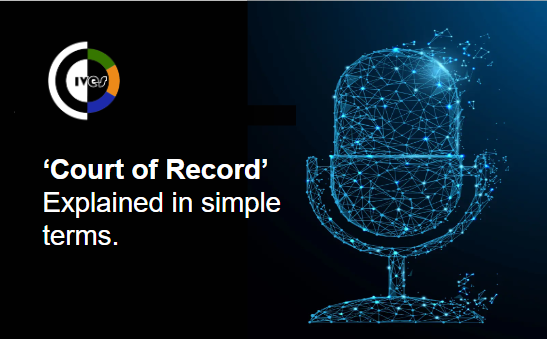
A "court of record" is a legal term that refers to a court whose proceedings and judgments are officially recorded and preserved as part of the court's permanent record. This record serves as a historical and legal archive of the court's activities, including hearings, trials, orders, judgments, and other important documents related to cases brought before the court. Here are some key characteristics and explanations of a court of record:
-
Official Documentation: A court of record maintains comprehensive and official documentation of all proceedings and actions that occur within its jurisdiction. This documentation is typically in the form of written transcripts, audio recordings, video recordings, and written orders or judgments.
-
Preservation of Records: The court is responsible for preserving these records in a secure and organized manner. This ensures that a complete and accurate account of all legal actions taken in the court is available for future reference.
-
Legal Authority: Courts of record are typically granted legal authority by statute or constitution, and they have the power to issue enforceable orders, judgments, and sentences. These documents are part of the official court record and are legally binding.
-
Appellate Review: The existence of a comprehensive record is crucial in the appellate process. Appellate courts review the records of lower courts to assess whether legal procedures were followed correctly and whether the law was applied properly.
-
Transparency and Accountability: Maintaining a complete and accurate record of court proceedings promotes transparency and accountability in the judicial system. It allows parties to access records relevant to their cases and helps prevent errors, omissions, or misconduct from going unnoticed.
-
Historical Reference: The records kept by a court of record serve as a historical reference for legal professionals, scholars, and the public. They provide insight into past legal decisions, the evolution of legal principles, and the administration of justice over time.
-
Record Authentication: Court records are generally considered authentic and reliable sources of information. They are often used as evidence in legal proceedings, including future trials, to establish facts and support arguments.
-
Public Access: Many court records are considered public records, and members of the public can access them, subject to certain restrictions and privacy laws. This allows individuals to review past cases, research legal precedents, and access information about court proceedings.
-
Court Reporters: In many courts of record, court reporters are responsible for creating verbatim transcripts of oral proceedings, such as hearings and trials. These transcripts become part of the official record.
It's important to note that not all courts are courts of record. Some smaller or less formal courts, such as small claims courts or traffic courts, may not maintain the same level of detailed record-keeping as higher-level courts. The distinction between courts of record and non-record courts can vary by jurisdiction and legal system. In general, however, courts of record play a fundamental role in upholding the principles of justice, accountability, and transparency in the legal process.

